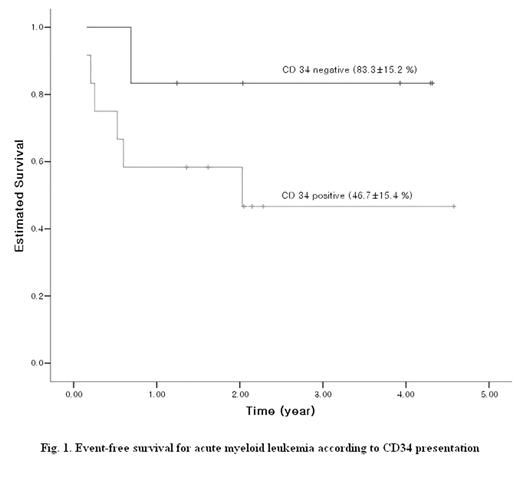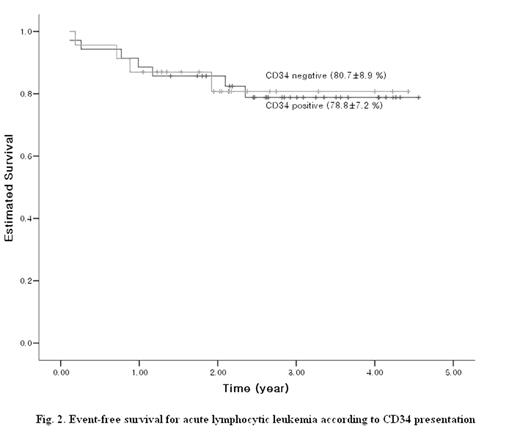Abstract
Purpose: CD34 is a surface glycophosphoprotein which is expressed on early hematopoietic stem cells. It has been thought that leukemic blast with CD34 expression was associated with poor prognosis. In this study, correlation between CD 34 expression and clinical outcome of childhood acute leukemia was explored.
Method: Seventy-six patients who were diagnosed as acute leukemia in Department of Pediatrics, Yonsei University Medical Center, Seoul, Korea were enrolled in this study. All patients were analyzed retrospectively. Myeloid markers expression in acute lymphocytic leukemia (ALL) as well as CD34 presentation in ALL and acute myeloid leukemia (AML) were analyzed. Three-year event-free-survival (EFS) was calculated according to whether those antigens were expressed or not.
Result: Fifty-eight and eighteen patients were ALL and AML, respectively. Median follow up period for all patients was 2.2 years (0.1–4.6 years). Boys and girls were 33 and 25 in ALL patients, respectively. In childhood AML, 11 and 7 patients were male and female, respectively. EFS for all patients with acute leukemia was 74.1± 5.4%. Three-year EFS of AML with or without CD34 expression was 83.3±15.2 % and 46.7±15.4 %, respectively. But, the difference was not different statistically (P=0.164, Fig. 1). In ALL, Three-year EFS was 80.7±8.9 % and 78.8±7.2 % for group of CD34 negative and positive, respectively (p=0.998, Fig. 2).
Conclusion: According to data, CD34 expression of AML in children might contribute to the survival rate, however EFS was not different statistically. We think that because of small number of cohort, the statistical results were not significantly different. In ALL, there were no statistically significant differences in EFS between CD34 expression or not.
Event-free survival for acute myeloid leukemia according to CD34 presentation
Event-free survival for acute lymphocytic leukemia according to CD34 presentation
Event-free survival for acute lymphocytic leukemia according to CD34 presentation
Disclosure: No relevant conflicts of interest to declare.
Author notes
Corresponding author



This feature is available to Subscribers Only
Sign In or Create an Account Close Modal